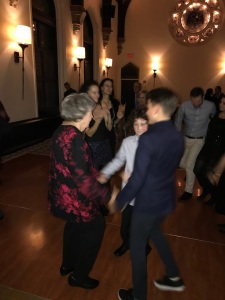Mother died on Sunday August 30, 2020 at 5:05 pm CDT.
A Memorial Mass was held on Tuesday, September 8th and streamed via Zoom. To read the tributes and homily given at the service, click on Memorial Service along the top of the website.
Those who knew and loved Beth will recognize her in her own words. – EJ Michel
I grew up in a family whose ancestors were as much a part of daily life as morning coffee, where stories were told to instruct, inspire, educate and entertain, in the kind of small town that needs no police force–though it had one–because of the cadre of little old ladies whose sharp ears and eyes and sharper tongues made them as formidable as the F.B.I.
That small town was a microcosm of civilization, an extension of French New Orleans, with ballroom dancing classes, afternoon teas where young girls learned manners, and debuts at a ball on Mardi Gras night, a rite of passage that signaled that a girl was ready to be a well-mannered, civilized adult guest at any event.
My family were all great readers–my father, sent to Vanderbilt at age 14, had Ransom Crowe and Allen Tate as English teachers. My maternal grandfather’s private library served the town until the founding of New Iberia Library in 1947.
Taught by Catholic nuns whose independent minds encouraged us to become individuals, not just members of a group, and blessed with a father who loved intelligent women, I grew up without knowing that women weren’t equal to men. (The fact that, in a French culture, women have a great deal of power didn’t hurt, either.) The three Dubus aunts were women of energy, great courage, and the ability to laugh in all but the most tragic circumstances. My Aunt Roberta, a true grande dame, wrote for local newspapers and was furious that her byline read “Robert” because no respectable woman’s name appeared in the newspaper except at her birth, marriage, and death.
Looking back, I see that in many ways I grew up in a sort of Camelot, an especially kind Camelot where generosity of spirit and a belief in the dignity of every human being prevailed. Racism had no place in my family, and anyone guilty of a racist remark learned very quickly just how wrong that was.
The one bad thing about growing up like this was learning, when I left Lafayette, how rare a place it truly is. While in many ways, Thomas Wolfe’s book title–YOU CAN’T GO HOME AGAIN–is true; for me, it is only by going home, at least in my mind and heart, that I see the world in a way that helps me write about it.

Momma dancing with Lucien and Sebastian at Walter’s Bar Mitzvah Party the last time all the family was together

